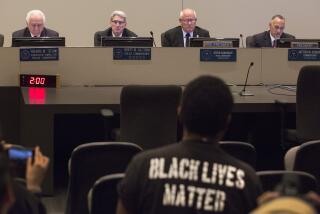Let Inspector General Do Her Job, for the Sake of L.A.
- Share via
In its 1991 report the Christopher Commission specifically recommended the creation of a powerful, independent inspector general to provide civilian oversight of the Los Angeles Police Department’s troubled disciplinary process. Its investigation, prompted by the videotaped beating of Rodney King, had found that police discipline under Chief Daryl Gates was lax and unevenly administered.
The voters’ approval of Charter Amendment 3 in 1995 finally established the inspector general’s office. It was filled about 18 months ago by a former prosecutor, Katherine Mader, who is confronting an insular department that has never welcomed advice from outsiders.
Mader, who reports to the Police Commission, is currently pushing hard for comprehensive and systematic tracking of “high-risk” officers, the problem cops who use too much force, perjure themselves or otherwise break the law and give police officers a bad name, often costing taxpayers plenty in legal costs and settlements. The inspector general’s message is the right one, but the messenger is getting a chilly reception from Police Chief Bernard Parks and City Atty. James Hahn.
Parks, the architect of his own ambitious reform agenda, which emphasizes accountability from the top down, is already working on better monitoring of high-risk officers. Yet during last Tuesday’s Police Commission meeting he seemed to dismiss her strong work as “simplistic.”
Hahn promises, with the help of a new computer system, to keep track of all litigation against the LAPD. Unbelievably, there is currently no central record of litigation against officers. Hahn too took a dig at Mader, saying she should have briefed him personally, not just a top member of his staff, before she gave a critical report to the Police Commission. Such petty remarks illustrate the need for an independent inspector supported by the civilian board.
Problem officers drag down the LAPD, as the Christopher Commission noted when it assembled a list of 44 officers who had generated a pattern of excessive-force accusations. But the department did not take the hint and start keeping its own comprehensive records on such officers. The tracking is needed to influence assignments and training, to protect the integrity of the LAPD and to promote accountability.
Inspector General Mader’s message of diligence is exactly what the Christopher Commission ordered. Her watchful prodding should be fully embraced by the chief and the city attorney.
More to Read
Sign up for Essential California
The most important California stories and recommendations in your inbox every morning.
You may occasionally receive promotional content from the Los Angeles Times.










